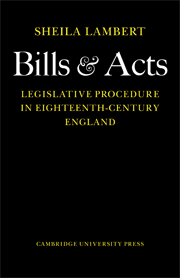Book contents
- Frontmatter
- Contents
- Preface
- Abbreviations
- Introduction
- 1 Robert Harper and parliamentary agency
- 2 Treatises and handbooks
- 3 The clerks: fees and agency
- 4 Parliamentary business
- 5 Private bill procedure
- 6 Estate bills
- 7 Inclosure bills
- 8 Local bills
- 9 Promulgation of the statutes
- 10 Conclusion
- Appendix I List of bills drawn by Robert Harper
- Appendix II Note on parliamentary sources
- Index
- Frontmatter
- Contents
- Preface
- Abbreviations
- Introduction
- 1 Robert Harper and parliamentary agency
- 2 Treatises and handbooks
- 3 The clerks: fees and agency
- 4 Parliamentary business
- 5 Private bill procedure
- 6 Estate bills
- 7 Inclosure bills
- 8 Local bills
- 9 Promulgation of the statutes
- 10 Conclusion
- Appendix I List of bills drawn by Robert Harper
- Appendix II Note on parliamentary sources
- Index
Summary
To five of the men who have been mentioned in this story we owe some of the most important and extensive collections for the parliamentary history of the sixteenth and eighteenth centuries now in the British Museum, and they were typical of the age that founded that institution. Nicholas Hardinge, Francis Hargrave, Robert Harper, Philip Webb and James West, moving in the triangle Bloomsbury – Chancery Lane – Westminster, must have known one another, although we know almost nothing about their relationships. Four were contemporaries, Hargrave much younger, so the connection goes on into the second generation. Webb, who did not become a barrister until late in life, was called at Lincoln's Inn on the same day as Robert Harper junior. Webb, West, Harper's son Samuel and Hardinge's son George were all fellows of the Royal Society. Hargrave acknowledged Samuel Harper's help with the book he intended as the first volume of a definitive edition of Hale's writings. Hardinge and West made purchases at Le Neve's sale in 1731, before either held any official position. All five were collectors according to their means; with West it was a passion and he was the only one wealthy enough to indulge his taste to the full. They have come together in this book, not because of their literary and antiquarian interests but because they were all concerned with the task of getting legislation through parliament.
- Type
- Chapter
- Information
- Bills and ActsLegislative procedure in Eighteenth-Century England, pp. 187 - 193Publisher: Cambridge University PressPrint publication year: 1971



